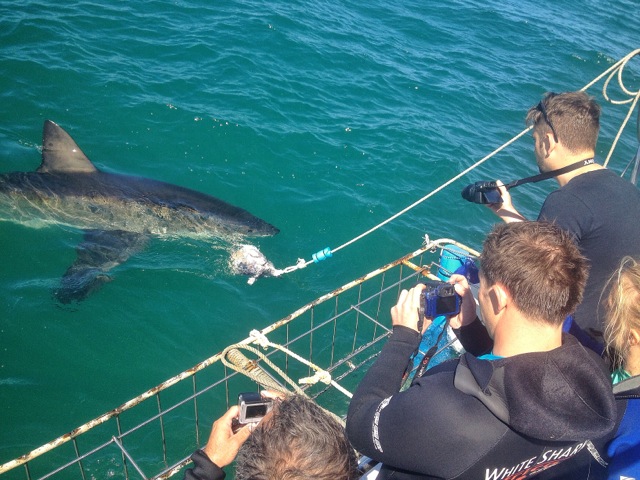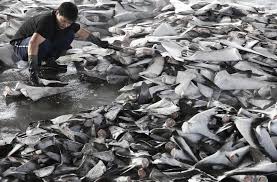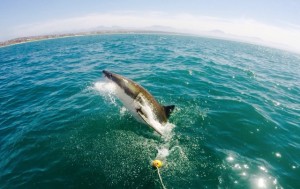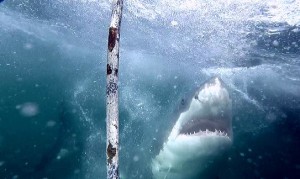Marine Life & Conservation
Consider Cage Diving

Great white shark cage diving has become a growing industry in areas such as Australia, Mexico, and South Africa. Whether for an interest in sharks, an adrenaline rush, or a spontaneous vacation adventure, thousands of tourists eagerly plunge into cages to experience the great white shark in its natural environment.
Despite the growing industry, there are many controversial issues regarding white shark cage diving and the possible negative effects it may cause the animal. Some believe that sharks are drawn into areas they would not normally be. Others believe that chumming for sharks teaches them to associate boats – and humans – with food. The most controversial issue however must be around ensuring the safety of the sharks during cage diving activities as well as the safety of the divers in the cage. Many people believe that sharks are being purposely led or dragged into the cages to add to the excitement and experience of clients.
On the other hand there are many how believe that cage diving plays an important role towards promoting Shark conservation by raising awareness and trying to change the negative perception people have of these animals.
 Sharks are being killed worldwide at an unsustainable rate. It is estimated a staggering 100 million sharks die at the hands of humans each year. 70 million of those are thought to be as a result of shark finning. As the shark fin soup industry grows in China, it puts added pressure on fishermen to kill increasing numbers of sharks. In this particular industry, the fins are the focus of interest, leaving no concern for the well-being of the shark once the fins are removed. Often the shark is thrown back into the ocean, unable to swim which leads to death caused either by drowning or by becoming defenceless pray. Aside from the shark finning industry, sport fishing, beach nets, and by-catch are also aiding in diminishing shark numbers across the world. Currently, 90% of shark species are believed to be endangered.
Sharks are being killed worldwide at an unsustainable rate. It is estimated a staggering 100 million sharks die at the hands of humans each year. 70 million of those are thought to be as a result of shark finning. As the shark fin soup industry grows in China, it puts added pressure on fishermen to kill increasing numbers of sharks. In this particular industry, the fins are the focus of interest, leaving no concern for the well-being of the shark once the fins are removed. Often the shark is thrown back into the ocean, unable to swim which leads to death caused either by drowning or by becoming defenceless pray. Aside from the shark finning industry, sport fishing, beach nets, and by-catch are also aiding in diminishing shark numbers across the world. Currently, 90% of shark species are believed to be endangered.
It is a worldwide common misconception that the shark is to be a feared predator. This misunderstanding of the great white shark generates negative perspectives on the animal making support on issues concerning the sharks a challenging matter of contention.
White shark cage diving gives an opportunity for an understanding of the animal through education provided through crew members during the experience on the boat and inside the cage. As the clients see the sharks for themselves, a pre-conceived opinion of a mindless killer can change to that of respect and admiration for an apex predator. If no education or research is being done by white shark cage operators, then it is simply a business, contributing nothing to the protection and conservation to these animals, merely providing tourists with their great underwater photos of a massive shark.
 In South Africa, the right to own a cage diving permit is closely coupled with the responsibility to contribute towards conservation and research. A responsible cage diving company will remain within strict permit guidelines and adhere to criteria set by the Governing body. For instance, the bait handler’s job is to entice the sharks as close to the cage as possible, avoiding contact between the shark and the cage or boat. A skilled bait handler is able to keep the bait (usually a tuna head) out of reach, should the shark lunge towards it, but also avoid leading the shark to collide with the cage, which can be extremely difficult in low visibility conditions. If the shark decides to breach on the bait, the handler may not see it until it hits the surface. Throwing the bait out a safe distance from the cage minimizes the risk of the shark hitting or landing on the cage. Of course in this instance, the clients in the cage will see nothing of the shark underwater. It’s also important to remember that every shark behaves differently. Much like people, each have their own personality, making it difficult to predict the movements of a shark around the boat. The bait handlers most geared towards conservation will put shark safety above clients getting their close up.
In South Africa, the right to own a cage diving permit is closely coupled with the responsibility to contribute towards conservation and research. A responsible cage diving company will remain within strict permit guidelines and adhere to criteria set by the Governing body. For instance, the bait handler’s job is to entice the sharks as close to the cage as possible, avoiding contact between the shark and the cage or boat. A skilled bait handler is able to keep the bait (usually a tuna head) out of reach, should the shark lunge towards it, but also avoid leading the shark to collide with the cage, which can be extremely difficult in low visibility conditions. If the shark decides to breach on the bait, the handler may not see it until it hits the surface. Throwing the bait out a safe distance from the cage minimizes the risk of the shark hitting or landing on the cage. Of course in this instance, the clients in the cage will see nothing of the shark underwater. It’s also important to remember that every shark behaves differently. Much like people, each have their own personality, making it difficult to predict the movements of a shark around the boat. The bait handlers most geared towards conservation will put shark safety above clients getting their close up.
Conversing with clients is another important conservation tool that is used by most cage diving companies. With anything between 5-30 clients on a cage diving shark trip, there is a fantastic opportunity here for crew and biologists to be in conversation with clients about the animals they are seeing and the behaviour they are witnessing. Interesting facts conveyed in the right way make the trip educational and fun while helping to change the negative image attached to the sharks. Further information about the area they are in, as well as the food they eat is also important for understanding white shark behaviour. This makes having crew members that are passionate and open to taking with clients essential on the boat.
 For a responsible operator, client safety is extremely important. At the start of every tour, there is a safety briefing from a member of the crew or in the form of a video presentation. This outlines what the client can expect from the day, and in particular, how to make sure the day is safe for everyone on board. Emergency procedures should be explained in detail and the client should board the boat feeling safe and comfortable with the crew. As part of the safety briefing, clients are warned not to touch the sharks. This may seem like an obvious warning, but there have been many cases of divers wanting to get even closer, pushing their arms and cameras through the cage, leading to injuries caused either by the jaws or a shark’s tough skin. To avoid this most cages are built with an inner rail, for divers to hold on to and push themselves under water as sharks pass by. Those that try and touch sharks are usually removed from the cage.
For a responsible operator, client safety is extremely important. At the start of every tour, there is a safety briefing from a member of the crew or in the form of a video presentation. This outlines what the client can expect from the day, and in particular, how to make sure the day is safe for everyone on board. Emergency procedures should be explained in detail and the client should board the boat feeling safe and comfortable with the crew. As part of the safety briefing, clients are warned not to touch the sharks. This may seem like an obvious warning, but there have been many cases of divers wanting to get even closer, pushing their arms and cameras through the cage, leading to injuries caused either by the jaws or a shark’s tough skin. To avoid this most cages are built with an inner rail, for divers to hold on to and push themselves under water as sharks pass by. Those that try and touch sharks are usually removed from the cage.
In the case of bad weather conditions, trips are usually cancelled. Should a trip go ahead in poor conditions, the experience in the shark cage can be very unpleasant. If an operator goes out in poor conditions, it shows more of a focus on business than shark conservation.
In order to save sharks from extinction it is important for clients who seek the cage diving experience to be given the opportunity to see not only how sharks behave in the wild, but also factual information given by passionate crew members. This type of mindset spreading throughout the world gives a chance for positive outlooks and attitudes towards the sharks.
To find out more about Shark Conservation opportunities and how you can make a difference visit www.wsaecoprogram.co.za.
[youtube id=”0qDVgRs5ZIs” width=”100%” height=”400px”]
Marine Life & Conservation
Paul Watson Released as Denmark Blocks Japan’s Extradition Bid

Renowned anti-whaling activist Paul Watson has been released from custody in Greenland after spending five months in detention. Denmark’s Justice Ministry rejected Japan’s request for his extradition, citing insufficient guarantees that his time already served in custody would be credited against any potential sentence.
The 74-year-old Canadian-American was arrested on July 21 in Nuuk, Greenland’s capital, when his ship docked to refuel. His arrest was based on a 2012 Japanese warrant related to a 2010 encounter in Antarctic waters. Japan alleged Watson obstructed operations and caused damage to a whaling research ship during efforts to disrupt illegal whaling. Watson has consistently denied these claims, maintaining his commitment to marine conservation.
Denmark, which oversees extradition matters for Greenland, concluded that while the legal conditions for extradition were met, the lack of assurances from Japan regarding time-served credit made extradition untenable.
In a video shared by his foundation, Watson expressed gratitude and relief, saying, “After five months, it’s good to be out… and good to know they’re not sending me to Japan.” He added that the most difficult part of his time in custody was being separated from his two young sons.
Watson is a pioneering figure in marine conservation, known for founding the Captain Paul Watson Foundation in 2022 after decades of activism with the Sea Shepherd Conservation Society. His bold efforts to defend marine life have earned him widespread support, including from celebrities and conservationists. His work has also been featured in the acclaimed reality TV series Whale Wars.
Watson’s lawyer, Jonas Christoffersen, praised the decision, stating, “We are happy and relieved that Paul Watson is now free.” He added that Watson is eager to reunite with his family and continue his vital work.
The arrest occurred while Watson’s vessel, the M/Y John Paul DeJoria, was en route to the North Pacific with a team of 26 volunteers to intercept a Japanese whaling ship. His foundation described the arrest as politically motivated and emphasized that Watson’s actions were focused on ending illegal whaling practices.
Japan resumed commercial whaling in 2019 after leaving the International Whaling Commission, asserting that whale meat is a cultural tradition. Conservationists, however, continue to challenge these practices, highlighting their impact on marine ecosystems.
Despite the challenges, Watson remains steadfast in his mission to protect marine life and bring attention to whaling practices. His dedication to ocean conservation has made him a globally respected advocate for the environment.
Marine Life & Conservation
12 Days of Zero-Waste Fish-mas

This holiday period, the Marine Conservation Society, the UK’s leading ocean membership charity, invites you to make some simple changes to eating fish this Christmas to help our seas.
Dr Kenneth Bodles, Head of Fisheries and Aquaculture at the Marine Conservation Society, said, “During the festive season, our consumption increases, but so does waste. Sustainability isn’t just about where food comes from – it’s also about how you use it. By reducing waste and making the most out of your seafood, you’re not only taking steps to be more ocean-friendly, but can also help to cut costs during what is often one of the most expensive times of the year”.
The Marine Conservation Society has compiled twelve tips on how to consume seafood sustainably with zero-waste this Christmas:
Buy whole fish instead of fillets
Instead of fillets, consider buying whole fish such as salmon, hake, or lemon sole. By adopting a “nose to tail” approach with cooking, whole-baked fish not only feeds a crowd, but also helps to minimise waste and maximise sustainability by using up every part of the animal, including bones, skin, and fat.
Make fish stock
Leftover fish bones or shells can be put to good use by boiling them to make a nourishing fish stock or bisque. This can be frozen and preserved for later use and makes for a flavourful base in a soup.
Make your own fish pâté
Avoid waste by turning leftover fish, such as smoked mackerel or salmon, into a delicious pâté by blending with cream cheese and lemon. Perfect when paired with crackers.
The sustainability of salmon and mackerel varies depending on where and how it is caught or farmed. For more information on green-rated options, check the charity’s Good Fish Guide.
Buy frozen
By purchasing seafood that is frozen or vacuum-packed, this helps to reduce waste by extending the shelf life of your food.
Fish pie
If you’re wondering what to do with leftover cooked fish, why not opt for a classic fish pie with mashed potatoes, leeks, and a cheesy sauce? A sure crowd pleaser on Boxing Day.
Use the head
Don’t forget the fish head! The meat is incredibly tender and flavourful. The charity recommends a cod’s head curry or recreating Fallow’s renowned cod’s head in siracha butter.
By stretching your ingredients further, not only is this a more sustainable way to enjoy seafood, but also cost-effective by repurposing leftovers and cooking creatively.
Boxing Day brunch
Mix leftover kippers or smoked salmon with scrambled eggs for a tasty, zero-waste, Boxing Day brunch.
For best choice, make sure you buy kippers, or herring, from the North Sea and the North Irish Sea.
Zero-waste storage
A top tip from the Marine Conservation Society to avoid waste is freezing fish offcuts to save for future use.
Crisp up the skin
Even leftover fish skin can be turned into a quick savoury snack by crisping it up in an air fryer with a little olive oil and salt.
Anchovies two ways
Leftover anchovies can either be blended with butter to make a delicious anchovy butter or tossed into pasta for a hit of umami flavour.
The charity recommends opting for anchovies caught in the Bay of Biscay for best choice.
Fishcakes
For an easy, zero-waste meal, leftover seafood trimmings can be mixed with mash and fried in breadcrumbs to make fishcakes.
Pickled mussels
Try pickling mussels in 1:1 vinegar and water, with a dash of sugar for a sustainable, zero-waste snack that can be enjoyed well beyond the festive season.
Mussels farmed in the UK are a seafood superhero. Grown using low-impact methods and harvested by hand, they get all the food they need from the sea around them. This makes them one of the most sustainable, ocean-friendly, and cost-effective seafood options.
Players of People’s Postcode Lottery have raised £6.6M towards the Marine Conservation Society’s vital work in making seafood more sustainable.
Laura Chow, Head of Charities at People’s Postcode Lottery, said: “Fish is a festive favourite for many, but making sustainable choices when it comes to how we buy and eat seafood makes all the difference for our ocean. Support from players of People’s Postcode Lottery has helped the Marine Conservation Society further its sustainable seafood work, so that we can all enjoy healthier, better protected seas.”
The Marine Conservation Society encourages you to make sustainable seafood choices a year-round habit, not just for Christmas. To check how sustainable the seafood on your plate is, you can visit the charity’s Good Fish Guide. The Guide helps consumers and businesses identify the most sustainable seafood using a simple traffic light system, based on where and how species are caught or farmed. Green is the best choice, amber means improvements are needed, and red indicates fish to avoid buying.
Zero-waste gift idea
Why not embrace a zero-waste Christmas by gifting a membership to support marine conservation? It’s a meaningful, low-waste gift that helps protect our ocean for generations to come. Memberships start from as little as £5 a month – the price of a sandwich and drink from your local coffee shop.
Find the latest sustainable seafood advice for wild-caught and farmed seafood on the Good Fish Guide, downloadable to your phone from www.mcsuk.org/goodfishguide.
-

 News2 months ago
News2 months agoIconic SS United States to become the World’s Largest Artificial Reef
-

 News3 months ago
News3 months agoBook Review – 52 Assignments: Underwater Photography
-

 Gear News3 months ago
Gear News3 months agoDYNAMICNORD – New German diving brand enters the British market
-

 News3 months ago
News3 months agoExploring Cenote El Pit: A Diver’s Dream
-

 Gear News3 months ago
Gear News3 months agoTry BARE drysuits (and maybe even win one!) this Friday with Sea & Sea at North West Dive Fest
-

 Marine Life & Conservation3 months ago
Marine Life & Conservation3 months agoBook Review: Coral Triangle Cameos
-

 Blogs2 months ago
Blogs2 months agoDive the Egyptian Red Sea this Autumn with Regaldive
-

 News3 months ago
News3 months ago2024 Ocean Art Underwater Photo Competition Announced



